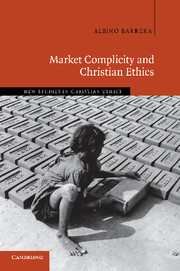Book contents
- Frontmatter
- Contents
- General editor's preface
- Acknowledgments
- Introduction
- PART I THEORY: MATERIAL COOPERATION IN ECONOMIC LIFE
- 1 The nature of material cooperation and moral complicity
- 2 Complicity in what? The problem of accumulative harms
- 3 Too small and morally insignificant? The problem of overdetermination
- 4 Who is morally responsible in the chain of causation? The problem of interdependence
- PART II APPLICATION: A TYPOLOGY OF MARKET-MEDIATED COMPLICITY
- PART III SYNTHESIS AND CONCLUSIONS
- References
- Index
2 - Complicity in what? The problem of accumulative harms
Published online by Cambridge University Press: 16 May 2011
- Frontmatter
- Contents
- General editor's preface
- Acknowledgments
- Introduction
- PART I THEORY: MATERIAL COOPERATION IN ECONOMIC LIFE
- 1 The nature of material cooperation and moral complicity
- 2 Complicity in what? The problem of accumulative harms
- 3 Too small and morally insignificant? The problem of overdetermination
- 4 Who is morally responsible in the chain of causation? The problem of interdependence
- PART II APPLICATION: A TYPOLOGY OF MARKET-MEDIATED COMPLICITY
- PART III SYNTHESIS AND CONCLUSIONS
- References
- Index
Summary
Since the cooperator's blameworthiness is merely derivative, we must first establish the nature of the principal's wrongdoing and why it deserves censure. What is the economic harm we have facilitated (the object of accountability)? This chapter undertakes two tasks. First, it briefly examines criteria from Christian ethics and liberal social philosophy on what constitutes economic wrongdoing. Second, it outlines the considerable difficulties we face in the attribution of individual responsibility for market harms because these economic ills are accumulative in nature and are mediated by the “invisible hand.”
COMPLICITY IN WHAT?
Christian ethics: telos
For Christian theology, a wrongdoing is that which goes against the divine order of creation. Creation is not a random event. God always acts for a purpose. There is an end (telos) for which everything has been created, including economic activity. Economic life is about facilitating the human quest to requite divine love through the reasoned use of freedom. The intellect and will enable humans to live up to the fullness of their creation in the image and likeness of God.
Christian ethics has an extensive literature on what constitutes economic wrongdoing. Since these works are well covered by both scholars and commentators, we will only briefly sketch their main features and how they might help our study of economic complicity. One approach to summarizing Christian economic ethics is to examine the official statements on economic life by the various Christian traditions.
- Type
- Chapter
- Information
- Market Complicity and Christian Ethics , pp. 30 - 47Publisher: Cambridge University PressPrint publication year: 2011



